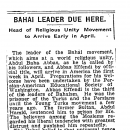Main menu
- ‘Abdu’l-Bahá’s Journey
- World Peace
- Stopping Racism in America
- Empowerment of Women
- More Principles...
- Prayer for America
Bahá’í Leader Due Here
Head of Religious Unity Movement to Arrive Early in April.
The leader of the Bahá’í movement, which aims at a world religious unity, ‘Abdu’l-Bahá Abbas, as he is called by his followers, and Abbas Effendi by official title, will arrive in America the first week in April. Preparations for his welcome have been undertaken by the Persian-American Educational Society of Washington. Abbas Effendi is the third of the leaders of Bahá’ísm. He was the prisoner of the Turks and the Persians until the Young Turks movement a few years ago. The former Sultan, ‘Abdul Hamid, sentenced him to prison for life. The believers among the Moslems regarded his liberal tendencies with greatest distrust and punished him repeatedly.
The Bahá’í belief is that universal peace is possible only through harmony of all religions, and they teach that all religions are basically one. Hence they seek a return to first principles. Differences, they say, have arisen through the corruptions of theology and dogmas. All religions they believe are divinely inspired.
Abbas Effendi was born in 1844, and on the very day that Ali Mohammed made his declaration as first leader of the cult. It is estimated that about one-third of the Persians are now Bahá’ís. In America the number of friends of the movement has grown steadly since the teachings first became known at the World’s Fair at Chicago in 1893.
REPORT BY SEWAGE BOARD.
Metropolitan Board Outlines Colossal System Like Paris’s and London’s.
The Metropolitan Sewerage Commission, a board of engineers created by the city and State to make plans for the sanitary disposal of New York’s sewage, has sent to Mayor Gaynor the second in a series of reports in which the necessity for colossal main drainage works, such as those of London, Paris, and Berlin, is clearly foreshadowed. The commission recommends that the city be divided into four drainage areas in each of which there shall be a number of central points to which the sewage is diverted, and there purified to such an extent that the remainder can be discharged into the harbor without danger to health.
The report shows the necessity for constructing the great public works which will be necessary to deal with the sewage in a sanitary manner and lays the foundation for subsequent reports in which the location, size, cost, and method of constructing and operating the great drains pumps, screens, and outfalls will be fully described.
The members of the commission are George A. Soper, President; James H. Fuertes, H. de B. Parsons, Charles Sooysmith, and Linsly R. Williams. The offices of the commission are at 17 Battery Place.
OPPOSE SUBWAY LEASES.
Objection to Failure of City to Take Advantage of Elsberg Law.
The regular monthly meeting of Typographical Union No. 6, held yesterday afternoon in the Murray Hill Lyceum, Thirty-fourth Street and Third Avenue, was attended by more than one thousand members, and a resolution was adopted, caling for a mass meeting of the union to be held in a few days to protest against the Public Service Commission leasing the new subways to the contractors and not taking advantage of the Elsberg law, which provides for city operation.
The resolution also denounced the proposed changes in the transit law, which would make possible the carrying out of the present plans of the Interborough and Brooklyn rapid transit companies. Charles M. Maxwell, President of the union, presided.









